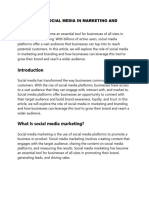Concept
Social Media Marketing (SMM) has emerged as one of the most impactful and essential
strategies in the modern marketing world. In today’s digital age, people spend a significant
amount of their time on social media platforms like Facebook, Instagram, YouTube,
LinkedIn, Twitter (X), and TikTok. Businesses have recognized the massive opportunity
these platforms offer to promote their products, build relationships with customers, and
create lasting brand awareness.
Social media is no longer just a tool for communication; it has evolved into a powerful
marketing channel that allows brands to engage, interact, and form connections with their
audience in real-time. This report explores the concept, features, importance, and impact
of Social Media Marketing on businesses and consumers.
Social Media Marketing is not just a trend but a fundamental part of modern business
strategy. It bridges the gap between brands and consumers, fostering relationships, trust,
and loyalty. By combining creative content, real-time engagement, targeted advertising,
and data-driven strategies, businesses can leverage social media to achieve remarkable
growth.
Whether it’s building awareness, driving sales, or maintaining a reputation, social media
marketing remains a vital tool in the marketer’s toolkit. As platforms evolve and consumer
behaviors change, businesses must stay adaptable and innovative to succeed in this ever-
changing digital landscape.
What is Social Media Marketing (SMM)?
Social Media Marketing (SMM) is the process of using social media platforms to promote a
product, service, or brand. It involves creating and sharing content tailored for each
platform to achieve marketing goals such as building brand awareness, increasing website
traffic, generating leads, or driving sales.
�Unlike traditional advertising, which focuses mainly on broadcasting messages, social
media enables two-way communication, allowing businesses to engage directly with
customers through likes, comments, shares, and direct messages.
Social media marketing leverages a variety of formats — posts, images, videos, live
streams, stories, reels, and more — to capture attention and build relationships with
audiences.
Core Objectives of Social Media Marketing
The main goal of SMM is to help businesses connect with their audiences and achieve
various marketing objectives. Some of the primary objectives include:
1. Brand Awareness
Social media platforms help businesses reach larger and more diverse audiences.
Frequent and creative posting helps make a brand more recognizable and builds familiarity
among users.
2. Customer Engagement
Through comments, shares, direct messages, polls, and interactive content, businesses
can engage customers in meaningful ways, making them feel valued and heard.
3. Lead Generation
�Many businesses use social media to capture potential customers through sign-up forms,
giveaways, or links to landing pages that lead to conversions.
4. Driving Website Traffic
Strategic content, calls-to-action (CTAs), and promotions help drive users from social
media platforms to a company’s website, increasing opportunities for conversions.
5. Reputation Management
Brands can monitor what people are saying about them, respond to feedback, and manage
their reputation in real-time.
Components of Social Media Marketing
A successful social media marketing strategy consists of several key components:
1. Strategy Planning
Before engaging in social media activities, brands must define their goals, identify their
target audience, choose the right platforms, and create a content plan aligned with their
objectives.
2. Content Creation
�Content is at the heart of social media. Posts, blogs, photos, videos, and infographics
should be tailored to the audience and platform while remaining consistent with the
brand’s voice.
3. Social Advertising
Most platforms offer paid advertising opportunities that allow businesses to target specific
demographics. Advertisements can promote products, drive traffic, or increase
engagement with precision targeting.
4. Community Management
This involves monitoring comments, responding to queries, managing reviews, and
maintaining healthy communication between the brand and its audience.
5. Analytics and Performance Measurement
Success in SMM is measurable. Platforms provide data on reach, impressions,
engagement, clicks, and conversions. Analytics help businesses refine their strategies
based on what works best.
Popular Social Media Platforms for Marketing
Each platform offers unique opportunities for businesses depending on their target
audience and industry:
� 1. Facebook (Meta)
Offers broad reach, detailed advertising tools, business pages, and groups. Suitable for
both B2C and B2B brands.
2. Instagram
Highly visual, ideal for brands in fashion, beauty, travel, and lifestyle. Focuses on images,
stories, reels, and influencer marketing.
3. Twitter (X)
Useful for quick updates, customer service, industry news, and engaging in trending
conversations.
4. LinkedIn
Primarily for professional networking and B2B marketing. Great for thought leadership and
recruiting.
5. YouTube
The largest video-sharing platform; ideal for tutorials, reviews, interviews, and brand
storytelling through visual content.
6. TikTok
�Focused on short-form creative video content. Popular among younger audiences, ideal for
viral marketing.
7. Pinterest
Visual discovery platform; commonly used by businesses related to fashion, home décor,
recipes, and DIY projects.






















































































